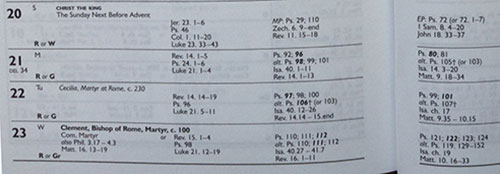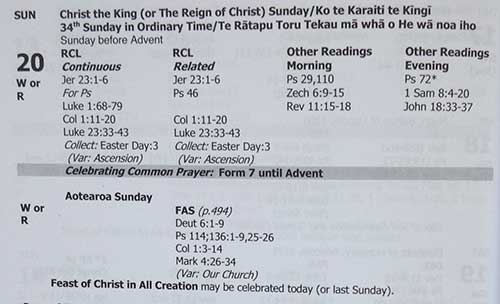Peter Carrell from his sabbatical brought back some lectionary booklets and lent me the ones from the Church of England and the Anglican Church Province of South East Asia. [Thanks!]
I scanned quickly in the CofE one looking for this time next year (above). Of course I anticipated there would be fewer options than we have but, even expecting that, I still misjudged as I flicked the booklet from the back. There was so little there I presumed I was looking at an abbreviated summary anticipating the following year (2017). I wasn’t. That’s all there is.
Compare it to NZ’s (please don’t compare the quality of the photos – that’s not my area of competency):
Because the scale on your screen is unclear: the CofE entry for Christ the King is 17mm (0.7 inch). The NZ entry for the same day is 8cm (3.3 inches) nearly 5 times as big.
NZ allows not only for a variety of titles, but a variety of celebrations: Christ the King, or Aotearoa Sunday, or the Feast of Christ in All Creation. As if that isn’t enough, at least one NZ cathedral celebrated the feast of St Cecilia on Sunday. The RCL is in the lectionary booklet, but our church also allows the 3 Year Cycle, and another 2 Year Cycle (not forgetting the BCP).
“New” and “creative” trump “common worship” in NZ. I am not aware of any reputable research that demonstrates that constant novelty helps to grow congregations – either numerically or in prayerfulness.
Yes, the CofE does have some flexibility, but there is no comparison with NZ (where the Anglican Church would merely have the numbers of a good CofE diocese). NZ Anglicanism values what CofE offers but, and this is important, it is not the (CofE) spirit and value of common worship that is valued, it is the resources that CofE has prepared that NZ Anglicans can add as yet further new and creative options to enlarge options in the Anglican Church of Or.
To extend the point: the CofE has about ten eucharistic prayers to choose from. NZ Anglicans, by contrast, have no limit – here we may use any eucharistic prayer authorised anywhere in the Anglican Communion; and if we don’t like any of those we can write our own using the Form for Ordering the Eucharist framework (NZPB pp512-514). In NZ we are not required to use any fixed greetings or responses (use any you find, or make them up yourself), we can use a confession or not, and if we use one we can source it from anywhere or write our own. And so on. And so forth.
Ps. The content of the lectionary booklet for the Anglican Church Province of South East Asia is almost identical to the CofE.
If you appreciated this post, consider liking the liturgy facebook page, using the RSS feed, and/or signing up for a not-very-often email, …





The odd thing is, Bosco, that congregations in our church most associated with novelty/creative worship often follow no lectionary at all!
On the whole, I think our ‘Church of Or’ is not providing lectionary choices because of a desire for novelty or creativity. I think it is simply a prisoner of expectations that all possible celebrations/variations are included as a “resource” for the church. Might our lectionary change if the expectations changed from “resourcing” to “supporting”, that is, supporting the common worship of the church by a lectionary without choices?
Thanks, Peter. There is a lot in your thought-provoking comment, not least: the need/merit of a discussion about the value of common worship at all. I think there are at least two things at work in our NZ church experience in this: a strong post-modern streak that scorns prescriptiveness (we see this also in our NZ educational curriculum); our church tendency to keep adding new to what is already there – rather than replacing what was there with an improvement (every lectionary system we have ever had is still authorised). I purposely left out your point: that even with wide provisions people still abandon agreements (because I expect that does happen in CofE also, but perhaps not at the level of bishops in the manner that it does here). Blessings.
Do either of you happen to know if the CofE lectionary is available anywhere online?
Do either of these two help? Common Worship Almanacs and Apps for Worship. Blessings.
C of E here: https://www.churchofengland.org/prayer-worship/worship/texts/lectionaries.aspx